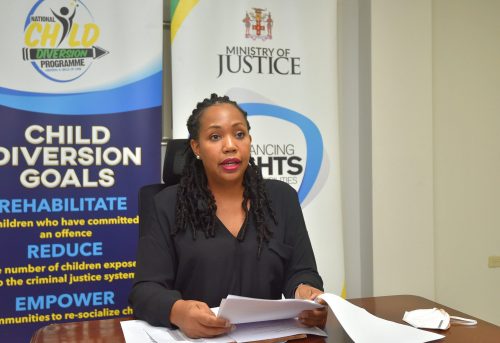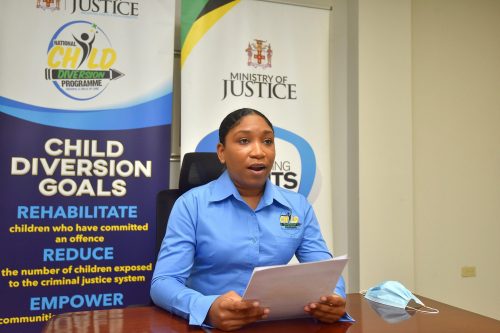Jamaica Working Towards Achieving SDGs
By: , March 23, 2021The Full Story
Since 2015, working towards achieving the United Nations (UN) Sustainable Development Goals (SDGs) has been high on the agenda for the Government of Jamaica.
These goals have become infused in the key development priorities of each sector of government, including Justice.
The overarching principle governing the approach to achieving the SDGs is that of ‘leaving no one behind’, as emphasised in Jamaica’s Voluntary National Review Report on the Implementation of the 2030 Agenda for Sustainable Development, June 2018.
One of the seventeen goals to be attained is goal number 16, which seeks to ‘Promote peaceful and inclusive societies for sustainable development, provide access to justice for all and build effective, accountable and inclusive institutions at all levels”.
The document went on to look at the targets achieved during the period which included the 2017 establishment of the National Child Diversion Programme, funded by the government, with support from the United Nations Children Fund (UNICEF).
The objective of the programme, framed within the context of the SDGs, is to provide ‘rights-based, gender-sensitive and child-centred justice delivery options that treat, rehabilitate and reintegrate child offenders’.
Speaking at a JIS Think Tank held recently, Justice Minister, Hon. Delroy Chuck, reaffirmed the Ministry’s commitment to working towards achieving this objective by paying special attention to youth who come in conflict with the law.
“We want to save them from the gangs that far too many of them enter. We want to save our girls from child pregnancy. We want to save our children from getting into further wrongdoing,” Mr. Chuck said.
“So this Child Diversion Programme exemplifies Jamaica’s commitment to leaving no one behind, which is one of the principles of the United Nations 2030 Agenda for Sustainable Development and also the Convention on the Rights of the Child. I would emphasise that this programme should be supported by every well-thinking community, parent and agency across Jamaica,” Mr. Chuck stated.
With more than 300 children diverted from the criminal justice system, further success is anticipated with the programme that began in March 2020.
Before the official start of the programme, groundwork was done in August of 2018 to enact the Child Diversion Act, which then came into effect on December 31, 2019.
Minister Chuck explained that the Government, through this legislation, made a commitment to ensuring that children are not denied their liberty and justice.
“Our great hope is that we can reduce the number of children who are actually institutionalised. The broad goals of the National Child Diversion Programme are to reduce the number of children who are charged with offences and, consequently… are exposed to the formal criminal justice system,” Mr. Chuck said.
“[The programme also aims] to increase the use of diversionary programmes that are expected to rehabilitate children as a response to crime and wrongdoing, as well as to protect the rights of the child, in keeping with international instruments and protocols to which Jamaica is a party. Also [it seeks to] to reduce the number of children who are institutionalised in lockups and correctional centres due to minor criminal offences,” he explained further.
The Justice Ministry has also connected the importance of child diversion to the prevention and reduction in recidivism, which is the tendency of a convicted criminal to reoffend.
The process of child diversion involves implementing measures for dealing with children accused of, alleged or recognised as having infringed the penal law, without resorting to the formal judicial proceedings.
This function is steered by a National Oversight Committee and 13 Child Diversion Committees, one for each parish, with Kingston and St. Andrew sharing a single committee.
“Where children are referred to the Child Diversion Committees, the Child Diversion Office is required to develop, approve, administer and supervise child diversion programmes and other programmes for the prevention of child delinquency,” Mr. Chuck said.
To guide the administration of this process islandwide, the Ministry, with the support of UNICEF, contracted National Child Diversion Consultant, Ruth Carey.

Ms. Carey is supported in her duties by key personnel, including the Child Diversion Coordinator, Technical Psychologist and the 14 Child Diversion Officers assigned by the parish.
“The National Child Diversion Programme targets children ages 12 to 17. The system exists to ensure that every child in conflict with the law is treated in a manner that recognises and upholds human dignity and worth. It also aims to divert the child from engaging in deviant and delinquent behaviour and instils in the child respect for the fundamental rights and freedoms of others,” Ms. Carey stated.
“The programme also takes into consideration the best interest of the child, the desirability of the child of rehabilitation, reintegration and assumption of a constructive role in society,” she added.
She further stated that child diversion is a referral-based programme to the Parish Child Diversion Committee.
Committees have a justice of the peace, a minister of religion, a police officer, children’s officer, education officer, guidance counsellor, and a medical practitioner [in the form of a] clinical psychologist, paediatrician or counsellor, plus several other experts that sit across the island.
Children can be referred to child diversion either by a Constable or on the recommendation of the prosecutor or by the Court. Ms. Carey explains that the police can issue three types of referrals.
“[First is] an informal warning, which indicates that the child is suspected of committing an offence and has accepted responsibility for that offence. [Next is] a formal warning, which again is a documented warning for that child to attend to a police station to have an understanding of the implications of that offence. Then there is the police caution, which is the only type of referral which allows the child diversion programme to treat with that child,” Ms. Carey said.
The main types of offences received into the programme since inception include children having sex under the age of 15, malicious injuries to property and children deemed uncontrollable.
Ms. Carey noted that a number of children deemed uncontrollable have been referred to the programme.
“We have been fortunate through this legislation, because the Child Diversion Act does not only allow for the referral of children in conflict with the law, but it allows us to receive children who are in need of care and protection as well as those deemed uncontrollable. So, we have children who have committed offences such as larceny, unlawful wounding, incest, indecent assault and a few others,” she explained.
The trends in the age groups for children that the programme has seen as at December 30, 2020, show 137 boys aged 15 to 17 years and 19 girls within the same age range.
The 15 to 17 age range is the general cohort received to the programme, though there are a few referrals for persons who would have committed an offence as a child, but have been referred to the programme although they are now 18 or 19.
Before a child can be allowed to participate in the programme, they are required to accept responsibility of the offence, provide consent to participate (for children under 14, parents would consent) and the consent of the victim is also needed.
Activities under the programme have been centred on sensitisation in recent months.
“We have conducted over 280 sensitisations across the island targeting police officers, court professionals and community persons. Judges were also targeted through partnership with the Judicial Education Institute, where they were trained on the Act as well as the process and procedures of the programme. We also trained all our stakeholders and personnel involved and established our Training of the Trainers programme so that we can continue the delivery of our national curriculum across the island,” Ms. Carey said.
When referrals to the programme are received, it is the duty of the child diversion officer in each parish, to conduct various assessments.
These include the Intake, Risk, Drug and Substance Abuse Assessments. Child diversion officers are then tasked with the job of creating treatment plans, which also includes assigning a mentor.
Every child that is diverted to the programme is assigned a mentor to help supervise and support the programme throughout the programme.
Treatment methods or options provided include referrals to the National Council on Drug Abuse, Women’s Centre of Jamaica Foundation, mental health professionals and child guidance clinics.
They are also referred to the Ministry of Education, Youth and Information; HEART NSTA Trust; Police Youth Clubs; Churches; Restorative Justice Programme and the Justice Ministry’s Victim Services Division.
Child Diversion Officer for the Parish of Portland, Simonette Rose Daniels, said the relationship she has with her clients and their parents or guardians, has been great.

“Most of my clients have been receptive to what has been outlined in their achievement plans and have communicated with me openly their achievements at intervals and even challenges. For those who may have challenges at any point throughout the programme, this can be normal and we are there to support them in the best way that we can as child diversion officers, mentors, community members and service providers,” Mrs. Daniels said.
For more details on the Child Diversion Programme, persons can visit the Ministry’s website at www.moj.gov.jm.




